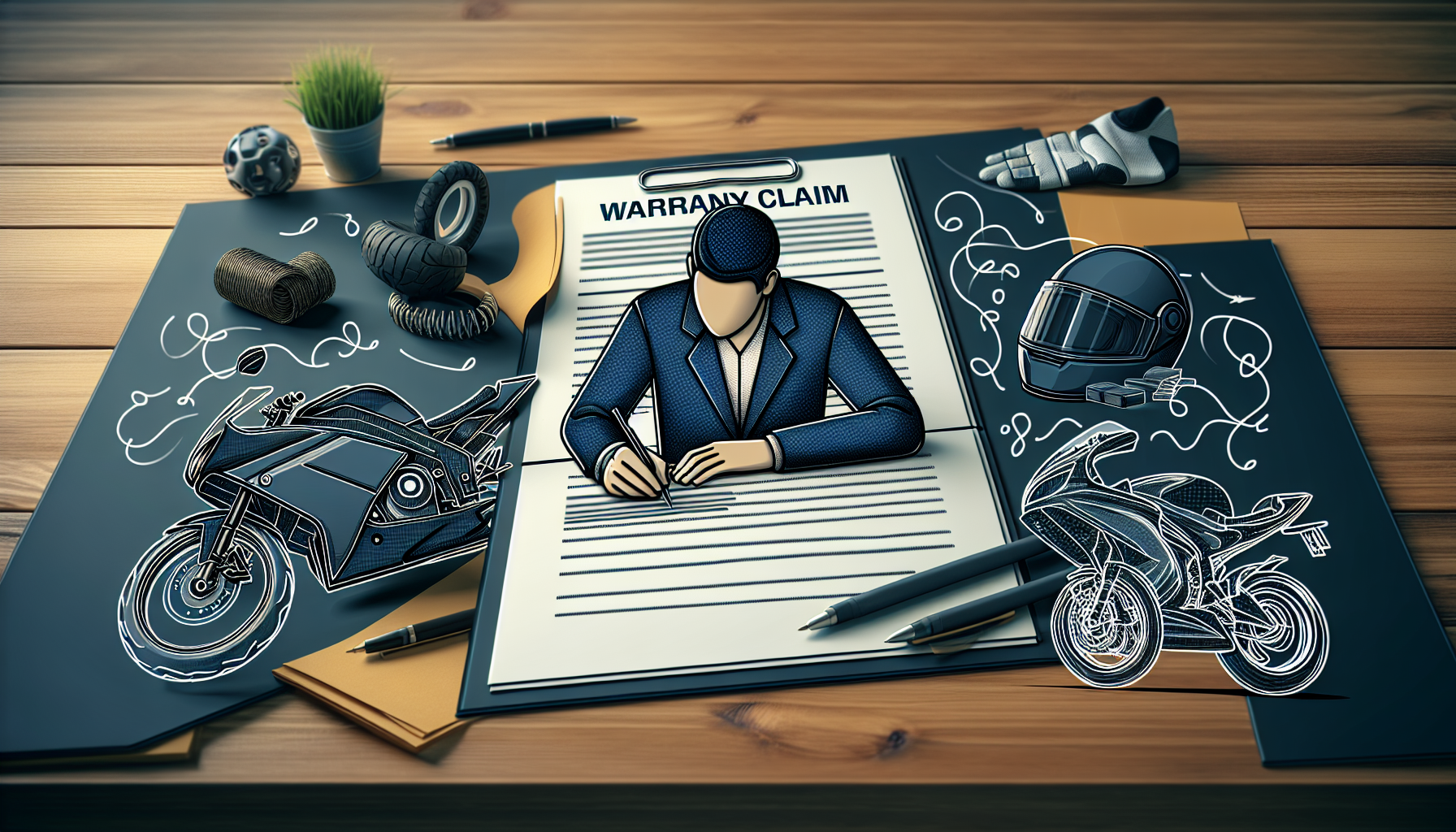If you own a motorcycle, ATV, or any other recreational vehicle, you’ve likely heard of a powersports warranty. But what is a powersports warranty exactly? It’s a plan designed to shield you from the expense and hassle of unexpected repairs due to mechanical or electrical failures. In this article, we’ll dissect what these warranties cover, their duration, and the types available, so you can understand whether this protective measure fits your adventurous lifestyle.
Key Takeaways
- A powersports warranty covers repairs for mechanical and electrical failures in vehicles like motorcycles, ATVs, snowmobiles, and includes labor costs, parts replacement, and may extend to major components like the engine and electrical systems.
- Warranties can vary from short-term manufacturer warranties to extended service contracts from third-parties, offering additional benefits, and are crucial for financial protection, peace of mind, and can enhance the resale value of the vehicle.
- Maintaining warranty validity requires adhering to the manufacturer’s maintenance schedule and avoiding neglect or unauthorized modifications, with the flexibility to perform maintenance outside dealership services without affecting warranty status.
Decoding the Powersports Warranty

A powersports warranty is a special type of coverage designed for recreational vehicles like:
- motorcycles
- dirt bikes
- ATVs
- personal watercraft
- snowmobiles
The main goal of these warranties is to protect owners from the financial burden of mechanical breakdowns and failures. They typically cover mechanical and electrical defects, thus mitigating expenses for repair or replacement of critical vehicle components.
Next, we will examine the specifics of a powersports warranty more closely.
Definition and Scope of Coverage
When we talk about powersports warranties, we’re referring to coverage for a vast range of vehicles. You can find a wide variety of vehicles such as motorcycles, trikes, scooters, and more. They are designed for different terrains and purposes. But what does this warranty cover? It generally includes repairs for mechanical and electrical failures, replacement of defective parts, and labor costs associated with these repairs. The scope can extend to major components like the engine, transmission, drive system, and electrical systems. It remains important, however, to familiarize yourself with the details of your contract, as it will detail the extent of the coverage, the management of repairs or replacements, and any exceptions.
Types of Powersports Warranties
There are typically two types of powersports warranties: those provided directly by the manufacturer and extended service contracts from third parties. While the manufacturer’s warranties typically cover a range of issues for powersports vehicles and offer comprehensive coverage, they might be more confined in scope compared to third-party extended warranties.
The choice between these hinges on your individual needs and the kind of vehicle you possess.
Duration and Terms
The warranty span for a powersports vehicle can vary from a minimum of 12 months to several years based on the manufacturer’s offerings and the type of warranty. For instance, warranties for new land vehicles can last up to 7 years, while those for new personal watercraft last up to 5 years. The terms of warranty coverage can also be constrained by specified mileage caps, or even offer unlimited mileage for motorcycles and certain street-usage vehicles. However, be aware that warranty coverage may be invalidated in case of odometer tampering, disconnecting, or replacement.
The Benefits of Having a Powersports Warranty

A powersports warranty is more than just a protective shield for your vehicle; it’s an investment that provides numerous benefits. Here are some of the benefits of a powersports warranty:
- Financial protection
- Peace of mind
- Potential savings on repairs
- Enhanced vehicle resale value
We will now delve into these benefits further.
Peace of Mind on the Road (or Trail)
Consider this scenario: you’re in the midst of an exciting off-road adventure when suddenly, your vehicle ceases to function. A nerve-wracking situation, isn’t it? In this situation, a powersports warranty proves invaluable. It offers preparation for unexpected vehicle repair expenses, potentially extending the life of your vehicle. From starter fixes to comprehensive engine repairs, a warranty got you covered.
Such warranties reduce worries about vehicle reliability and unexpected repair costs, thereby providing a sense of security for the owner. So, whether you’re planning an extended road trip or a long commute, an extended warranty offers the peace of mind you need to take on any trail or on road confidently.
Potential Savings on Repairs
The potential costs of repairs for powersports vehicles can quickly add up and burn a hole in your pocket. This is where a powersports warranty can be a real game-changer. It can cover most, if not all, repairs, preventing you from paying out-of-pocket for these expenses.
Service contracts offer the following benefits:
- Protection from the high cost of parts and labor, which can rise due to inflation and part scarcity
- Offset significant costs such as emergency repairs
- Example: AC condenser replacement costing over $756
Resale Value Enhancement
If you ever decide to sell your powersports vehicle, having an extended warranty can make it more appealing to potential buyers. Not only does it show that the vehicle was well-maintained, but it also provides the new owner with coverage, enhancing the vehicle’s resale value.
The transferable nature of extended warranties allows subsequent owners to benefit from existing coverage, which can lead to your vehicle commanding a higher resale price. However, understanding the process and conditions for transferring the warranty is critical, as it influences the ease with which you can offer this benefit to the buyers.
Navigating Warranty Claims and Deductibles

Navigating the world of warranty claims and deductibles can seem daunting, but it’s an essential part of owning a powersports vehicle. A deductible is an out-of-pocket expense that the warranty holder must pay before the warranty coverage applies to the repair costs. Deductibles can vary and may influence the upfront cost of the warranty and the expense during a repair claim.
By understanding how to file claims and the role of deductibles, you can make the most of your warranty coverage.
Filing a Claim: Step-by-Step
Filing a warranty claim is a straightforward process if you know the right steps. As soon as you encounter an issue with your vehicle, report it to the dealer or warranty provider to schedule a service visit. Provide them with specific details about the malfunction, including the age, condition, and brand of the item.
Work with the provider to decide if the malfunctioning item should be repaired or replaced, considering the repair costs and the item’s coverage limits. Once the repair is done, be prepared to pay the service fee and any additional charges not covered under the terms of the warranty.
Understanding Your Deductible
An extended car warranty deductible is akin to an insurance deductible. It is the amount you are liable for when a repair that falls under the warranty occurs. Service visit costs act as deductibles, starting around $75, and must be paid out-of-pocket, thus affecting the estimated costs when using warranty services. A higher deductible generally results in lower monthly payments for warranty coverage, but it also means a higher payment at the time of service, should repairs become necessary.
Special offers may reduce the deductible for authorized repairs performed by the dealer that sold the contract, and discounts might be available for military or senior citizens.
Dealer vs. Independent Service: Where Can You Get Repairs?
Deciding where to have your vehicle repaired is another important choice to make. Filing a claim with a service provider not approved by the warranty may lead to repairs not being covered. Dealerships typically employ factory-trained technicians specialized in specific vehicle brands, which can enable quicker and more precise diagnostic and repair services. However, their service and repair fees are usually higher due to their specialized facilities and staff, whereas independent shops may offer more cost-effective solutions.
Dealerships use OEM parts for repairs ensuring high compatibility and quality, while independent shops may provide cheaper aftermarket parts.
Extended Service Contract: Is It Worth It?

While an extended service contract can enhance your vehicle’s protection, is it worth the expense? The average cost of an extended service plan or warranty ranges from $350 to $700 per year of coverage, and may involve monthly payments between $100 to $200. Let’s assess its costs and benefits to make a well-informed decision.
Comparing Standard Warranty and Extended Service Contract
A standard warranty is typically included in the overall cost of a new vehicle and covers certain problems for a specific period of time or number of miles driven. Conversely, extended warranties can be acquired to prolong the coverage beyond the manufacturer’s initial warranty duration. These extended warranties often offer benefits like roadside assistance, which can prevent additional out-of-pocket expenses during emergencies.
While standard warranties are included with the vehicle, extended warranties require an extra charge and provide coverage for mechanical and electrical components outside the purview of the manufacturer’s warranty.
Analyzing Cost vs. Benefit
When considering the cost versus benefit of an extended warranty, it’s important to keep in mind that the potential costs of repairs can quickly add up. Extended warranties can be less costly than paying for repairs out of pocket, as multiple repairs can quickly exceed the cost of a warranty.
They offer a safety net against unexpected repair costs and provide financial predictability, especially for high-cost repairs.
Real-Life Scenarios: When Extended Coverage Pays Off
Extended warranties for powersports often include extras such as trip interruption benefits and roadside assistance, saving customers from additional unplanned expenses. Owners of vehicles that have a higher risk of malfunctions can avoid the financial burden of major repairs, like transmission work, by leveraging extended service contracts.
Extended service contracts also provide long-term security by ensuring that vehicles remain operational over many years, proving particularly valuable for long-term owners.
Routine Maintenance and Your Warranty

Routine maintenance is an essential aspect of owning a powersports vehicle. It not only ensures that your vehicle remains in top condition but also plays a crucial role in maintaining your warranty’s validity.
We will now discuss the importance of routine maintenance for the validity of your warranty.
Maintenance Requirements for Validity
To keep your vehicle’s warranty valid, you must follow the manufacturer’s recommended maintenance schedule. This includes routine maintenance tasks such as oil changes, brake inspections, and tire rotations, all of which must be performed as outlined in the vehicle’s service manual to avoid warranty coverage issues. The warranty may specifically exclude coverage for parts subject to wear and tear, like brake pads and tires.
Therefore, it’s vital to be aware of the specified maintenance requirements in the warranty terms to ensure compliance.
How Neglect Can Void Your Warranty
Just as proper maintenance is crucial for your warranty, neglecting it can have serious implications. For instance, if you cause damage due to improper maintenance, such as forgetting to replace an oil filter leading to engine damage, the warranty will not cover the resulting repairs. Even using dirty or improper fluids, like the wrong type of oil, can lead to damages that are not covered under warranty.
Similarly, modifications or the installation of aftermarket parts that cause damage to the vehicle can lead to a voided warranty.
Where to Perform Routine Maintenance
Now, you might be wondering where to perform the routine maintenance for your powersports vehicle. The good news is, you have options. The Magnuson-Moss Warranty Act states that it’s not legal to require the use of a manufacturer part or service in order to maintain a vehicle’s warranty.
This means that routine maintenance can be performed at independent shops or other dealerships not associated with the vehicle brand without affecting the warranty validity.
Purchasing a Warranty: Tips and Considerations
Purchasing a warranty for your powersports vehicle is a significant decision that requires careful consideration. From assessing your coverage needs and reading the fine print to contacting industry experts for advice, there are several factors you need to consider before making a purchase.
We will now look closely at these blocked considerations.
Assessing Your Coverage Needs
When assessing the coverage needs for a powersports warranty, it’s key to take into account the specific type of vehicle, be it a:
- motorcycle
- ATV
- watercraft
- snowmobile
Each has unique requirements. Choosing a powersports coverage that is custom-fitted to individual needs ensures that the policy provides the necessary protection and peace of mind for the user. It’s important to find a provider that can offer coverage tailored to these unique requirements.
Reading the Fine Print
It’s important to comprehend the precise coverage limitations and exclusions of a powersports vehicle warranty while reviewing the fine print. Potential claims on the warranty can be significantly affected by the warranty’s specific limitations and what is explicitly not covered.
Assessing the duration of coverage and overlap with the manufacturer’s warranty is essential for understanding the extended warranty’s full scope. Reviewing the cost of the extended warranty in relation to its coverage specifics helps in making an informed purchasing decision.
Contacting Industry Experts
For customized advice on powersports warranties, it’s strongly recommended to reach out to industry experts. They are accessible for consultation via phone or email, such as through Can-Am Off-Road’s contact number specifically for ATV & SxS expertise. A local BRP dealer is advised as the best go-to resource for all questions pertaining to powersports vehicle warranties.
When contacting experts, clearly stating whether one is a current owner or a prospective buyer clarifies the context, ensuring relevant and specific advice.
Summary
In conclusion, a powersports warranty is an essential tool that provides financial protection, peace of mind, potential savings on repairs, and even enhances your vehicle’s resale value. Whether you opt for a manufacturer’s warranty or a third-party service contract, understanding the coverage, terms, and how to file claims is crucial. Regular maintenance is a must to maintain the validity of your warranty. And remember, when purchasing a warranty, it pays to assess your needs, understand the fine print, and consult industry experts. So, gear up, secure your warranty, and enjoy the thrill of your powersports adventure with peace of mind.
Frequently Asked Questions
What does my motorcycle warranty cover?
Your motorcycle warranty typically covers faulty mechanical and electrical components, such as the engine, at no cost to you if the issues are not caused by your own actions.
What is not covered under extended warranty?
Under an extended warranty, normal wear and tear, preexisting damage, routine maintenance, wear items like tires and brakes, and damage resulting from lack of maintenance or abuse are not covered. Additionally, heavily modified vehicles may not be covered.
Is extended warranty worth it for bikes?
Yes, investing in an extended warranty for your bike is a worthwhile move to protect your investment and ensure longevity.
Are electrical issues covered by car warranty?
Yes, electrical issues are often covered by the factory warranty provided by the car manufacturer, as it typically includes coverage for parts connected to complex electrical systems.
What types of vehicles are covered under a powersports warranty?
Powersports warranties usually cover motorcycles, scooters, ATVs, personal watercrafts, and more.



